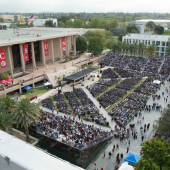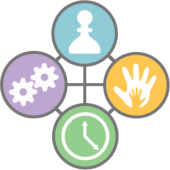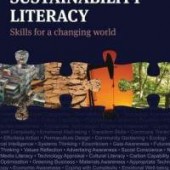
Abstract: A United Nations international collaboration between the Education for Sustainable Development (ESD) and the Principles for Responsible Management Education (PRME) resulted in the creation of Sulitest® (aka Sustainability Literacy Test) an open, online training and assessment tool freely available to higher education institutions globally. This study analyzes the effectiveness of the newly developed Sulitest® to not only measure sustainability literacy of higher education student populations, but also act as a catalyst for boosting affective learning outcomes by: (a) generating interest in sustainability-related issues, (b) improving sustainability-related understandings, and (c) enhancing students’ interests in the subject matter. In order to do so we present a two-phase, exploratory mixed-method pilot study. Preliminary results from this pilot study reveal Sulitest is a useful tool for not only assessing sustainability literacy but also spurring student interests and motivations in sustainability-related subject matters. Findings, discussion and limitations are provided.
Continue Reading
To assess the sustainability literacy of students at California State University, Northridge (CSUN), we administered a modified version of the Assessment of Sustainability Knowledge (ASK) to 2,993 students in 60 courses over 5 semesters. CSUN is a large minority-serving institution with a regional focus. Within the general student population, students gain about 2.7 percentage points each year as they progress from freshman to senior year. For each sustainability-related course they take (up to 3), they also gain an average of 2.7 percentage points. Within our core sustainability courses, students gain an average of 11.6 percentage points from pre-test to post-test. Students enter CSUN with a statistically significant gender gap in sustainability knowledge with males having average scores 7.6 percentage points higher than females, but the gender gap closes completely by completion of coursework in a sustainability minor program. Our students enter college with less sustainability knowledge than those in two other more selective institutions who conducted similar surveys (Ohio State University and Wartburg College) but gain knowledge at a similar rate. We also find that students with more prior sustainability knowledge self-select into sustainability courses and that students from different majors improve sustainability knowledge at different rates when taking related courses.
Continue ReadingAbstract: India has compulsory teaching and learning of Environmental Education at all levels of formal education. This was mandated through a Supreme Court directive. This study was conducted using a survey instrument that was used as a proxy of sustainability literacy. The instrument had open-ended questions to gauge the respondent’s perspectives, close ended knowledge-based questions, statements to understand attitudes and their awareness of eco-labelling/certification. The target group of study was the entire batch of 90 students (15 Female and 75 Male) that had joined the postgraduate programme in 2014. The students came with about of year of work experience. The major background was engineering and science with only eight percent with commerce background. All were found to be high achievers in their previous education in school and graduation.
Content analysis of the open ended question showed that 24 percent of the students agreed that economic development at the cost of environment is a short term solution, followed by 16 percent each saying that there is a need to have a balance or economic development should be at the least environmental cost. About seven percent said that economic profit can improve the environment and there is no option left if we need economic development. Only six percent putting comfort over the environment. Although the attitude was very positive, about 62 percent of the students were not able to articulate the difference between the quality of life and standard of living. 75 percent of the respondents supported the compulsory CSR act. 71 percent were in favour of extended producer responsibility. There seems to be a limited understanding of sustainable development and equates it to environmental conservation as any lay person who is informed by mass media. 72 percent did not understand the term Green Washing. The awareness was found to be moderate. Profit maximisation was the understanding as the goal of a business. Nearly half of them were of the opinion that consumers will not pay for environmentally friendly products. Although a high of 89 percent said that eco-labelling has an influence on consumer behaviour, very few of them were aware of eco-labels. Almost all agreed that polluters should pay 67 percent of them also believe that environmental clearances are an impediment to economic growth and 64 percent believe that privatisation leads to better utilisation of resources.
The study shows a pro environment attitude but at the same time a limited understanding of the depth of issues and only the economic centric perspective of sustainable development. Only 16 percent gave some hint of social dimension to sustainable development. Awareness of HDI and GDP was high but connection to quality of life was missing. The environment was high on priority as 24 percent of the students agreed that economic development at the cost of environment is a short term solution, followed by 16 percent each saying that there is a need to have a balance or economic development should be at the least environmental cost. There seems to be a limited understanding of sustainable development and equates it to environmental conservation as any lay person who is informed by mass media.
Also it was found that students were influenced by common business perspective being projected in Indian media. Business is becoming a major driver of sustainable development with increasing production and consumption along with population as a major reason for environmental degradation. It is recommended that social and environment be part of ethical framework of business education. It would be useful if details sustainability literacy assessments are done to inform the business management curriculum for the need to include environmental /sustainability management. The impact of undergraduate discipline was found to influence awareness and perception and hence it is important that the management curriculum removes the gap in sustainability literacy amongst students.

The Sustainability Education Framework for Teachers (SEFT) intends to build a capacity for educators to be able to understand: (i) the broad, complex nature of sustainability, (ii) the problem-oriented, solution driven nature of sustainability, and (iii) how sustainability connects to them as both citizens and classroom teachers. SEFT embraces four ways of thinking––futures, values, systems, and strategic which are conceptualized as being bi-directional and interconnected. The framework aids in linking sustainability topics that are seemingly disparate to the novice teacher population by building upon knowledge, skills, and attitudes necessary for problem solving with respect to complex sustainability challenges. Imagined as a conceptual framework, it offers organizing principles for examining and considering sustainability problem/solution constellations in a coherent fashion. The framework provides the opportunity for self-reflection and independent enquiry by considering and learning through real world foci. Likewise, SEFT offers a logical framework for working in interpersonal, intragroup, and intergroup situations. The four lenses require considering critical inquiries related to societal values, equity, and visions of the future; unpacking the status quo; and exploring and articulating pathways towards a sustainable tomorrow.
Continue ReadingFull PDF: Obermille & Atwood JSE Vol 7 Dec 2014 Abstract: The importance of teaching sustainability literacy is readily accepted, but relatively little attention has been paid to the adequacy or preparation of faculty to accomplish this task. At Seattle University, samples of incoming students, staff and faculty completed SUSTLIT, a survey of sustainability literacy. […]
Continue Reading
In this detailed and insightful review, Laura Henry-Stone admires the breadth and cohesiveness of this edited volume from mostly European sustainability educators. She makes a good case for bringing this wide array of pieces under one cover, for avoiding static definitions of sustainability, even the traditional “triple bottom line”, and rather looking outside reductionist approaches to find integration, inter-relation and the kind of broad strokes that the chapters in this book propose for educating and solving for sustainability.
Continue Reading